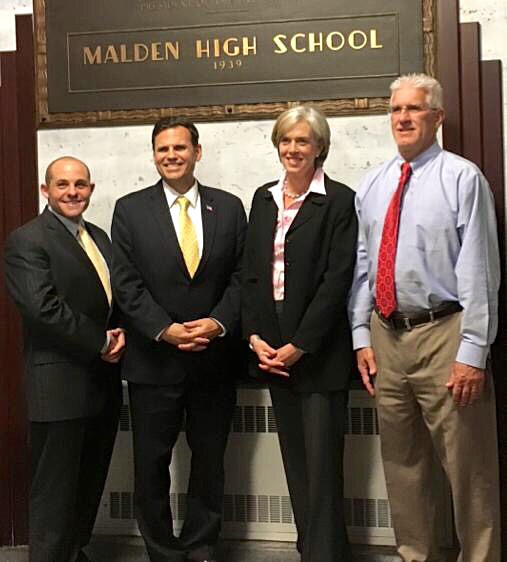
From the left, State Representative Steven Ultrino, Mayor Gary Christenson, Congresswoman Katherine Clark, and Principal Dana Brown are pictured posing outside of Clark’s College Affordability Workshop event on Wednesday, Oct. 14, 2015 at Malden High School. (Congresswoman Katherine Clark/Facebook)
Congresswoman Katherine Clark, a believer in turning “those dreams and aspirations” of affordably attending college into “a reality”, recently contacted Principal Dana Brown to sponsor a college affordability workshop for the students and parents of Malden High School.
To begin the night, Mayor Gary Christenson of Malden spoke on behalf of Brown. “Prior to [Brown’s] arrival, this type of workshop was never given” said Christenson. It is often said that a higher education is the key to success, and Christenson made sure to proudly note that “anyone who says the future is uncertain, hasn’t gotten to know the students at MHS.”
Christenson then introduced Clark, who spoke highly of the “outstanding students” at MHS. She reminded the students and parents in the crowd that “[these students] are the workforce of the future” to be a part of “our economy, and wonderful community”, and that starts by attending college. Although, Clark does understand that student debt has a financial “draw” on students, and “drags [the students]” down, hence why sponsoring such a workshop is important to her.

Joining Clark to speak was John Drew, the Assistant Vice Chancellor for Enrollment at the University of Massachusetts Boston, and Jonathan Hughes, the Customer Service Team Leader at MEFA, otherwise known as the Massachusetts Educational Financing Authority. Bentley University, Bunker Hill Community College, Framingham State College, and Tufts University were also present.
Drew first spoke of FAFSA, the Free Application for Federal Student Aid, which indicates how much the federal government believes you can contribute to your college tuition. The FAFSA is available to begin filing on January 1, 2016, and is extremely important for all students and parents to complete by the deadline. Drew advised not to wait for acceptances to come in, but to file not long after it opens because there is only a set amount of aid to give out. Hughes also commented on FAFSA and receiving merit stressing their importance, whether it is in the form of grants and scholarships, or need-based work studies and student loans.
Drew and Hughes also mentioned that when students compile the list of colleges they plan on applying to, it consists of safety and reach schools. Students should also make sure they have financial safety and reach schools, so they know they will be able to affordably attend at least one.
Financial aid eligibility is determined by subtracting the expected family contribution from the cost of attendance. Incoming college freshman can also receive up to five thousand five hundred dollars in federal direct student loans. This is only part of the process, but one of the most essential. This money is awarded through FAFSA and specific colleges that offer merit aid; not all colleges do. In order to receive this aid, you must be making satisfactory progress in school. The importance of maintaining a decent GPA (or grade point average) was also stressed.
UMass Boston and MEFA both strive to help families plan, save, and pay for college. In UMass Boston’s most recent data collection, they show that they met ninety percent of student need, which is a total of one hundred fifty six billion dollars including over five million dollars in merit scholarships.
Hughes, representing MEFA, stated that “after tonight, MEFA is available to help. It doesn’t end tonight.” Between 2013 and 2014, MEFA provided over one hundred eighty four billion dollars in undergraduate student aid, the most popular sources being 34% federal student loans, 25% federal grants, and 21% institutional grants and scholarships.
To wrap up the night and leave students with something to ponder on, Drew left the students with eight tips of advice, which were:
- Take the SATs more than once. Generally, students’ scores improve the second time.
- Utilize admissions and financial aid staffs. They are there to help.
- The first time you receive aid is not the last time. You can reapply every year, and typically the amount of aid you receive increases.
- Do not be scared away by a school’s price or its reputation. There are always options for financial assistance, and only you can form your own opinion of a school.
- Explore AP and dual enrollment classes. They look impressive on your transcript.
- Have fun with the process. Even though it can be stressful, exploring campuses and learning more about schools allows you to spend quality time with your parents or friends. It is a memorable experience, and should not always be stressful.
- You can work in college, but college is a job in itself. It is your priority. If anything, explore a work study program to help pay for school.
- Use a net price calculator. All schools provide one on their websites, and they will give you an idea of how much you will have to contribute to your overall tuition, room and board, and fees.
If you did not attend Clark’s College Affordability Workshop on Wednesday night, there is still time to research this information to help you learn more about affording college. Take this seriously; the process does not end after being accepted into schools. There are always people to help you, whether you contact a school’s financial aid staff, such as UMass Boston, MEFA, or even your own high school guidance counselor. College can be affordable for everyone if the process is done right.




